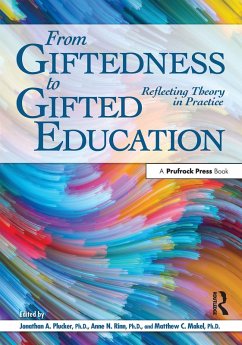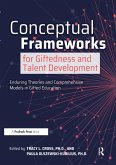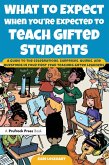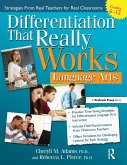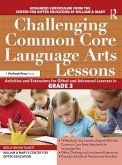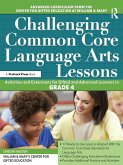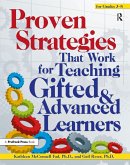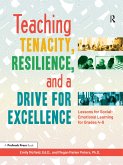From Giftedness to Gifted Education (eBook, PDF)
Reflecting Theory in Practice
Redaktion: Makel, Matthew C.; Plucker, Jonathan A.; Rinn, Anne N.
59,95 €
59,95 €
inkl. MwSt.
Sofort per Download lieferbar

30 °P sammeln
59,95 €
Als Download kaufen

59,95 €
inkl. MwSt.
Sofort per Download lieferbar

30 °P sammeln
Jetzt verschenken
Alle Infos zum eBook verschenken
59,95 €
inkl. MwSt.
Sofort per Download lieferbar
Alle Infos zum eBook verschenken

30 °P sammeln
From Giftedness to Gifted Education (eBook, PDF)
Reflecting Theory in Practice
Redaktion: Makel, Matthew C.; Plucker, Jonathan A.; Rinn, Anne N.
- Format: PDF
- Merkliste
- Auf die Merkliste
- Bewerten Bewerten
- Teilen
- Produkt teilen
- Produkterinnerung
- Produkterinnerung

Bitte loggen Sie sich zunächst in Ihr Kundenkonto ein oder registrieren Sie sich bei
bücher.de, um das eBook-Abo tolino select nutzen zu können.
Hier können Sie sich einloggen
Hier können Sie sich einloggen
Sie sind bereits eingeloggt. Klicken Sie auf 2. tolino select Abo, um fortzufahren.

Bitte loggen Sie sich zunächst in Ihr Kundenkonto ein oder registrieren Sie sich bei bücher.de, um das eBook-Abo tolino select nutzen zu können.
The fields of gifted education and talent development have numerous theories and conceptions for how to identify and serve students. This book helps introduce and apply these ideas to help reflect theory in practice.
- Geräte: PC
- ohne Kopierschutz
- eBook Hilfe
- Größe: 60.97MB
Andere Kunden interessierten sich auch für
![Conceptual Frameworks for Giftedness and Talent Development (eBook, PDF) Conceptual Frameworks for Giftedness and Talent Development (eBook, PDF)]() Conceptual Frameworks for Giftedness and Talent Development (eBook, PDF)51,95 €
Conceptual Frameworks for Giftedness and Talent Development (eBook, PDF)51,95 €![What to Expect When You're Expected to Teach Gifted Students (eBook, PDF) What to Expect When You're Expected to Teach Gifted Students (eBook, PDF)]() Kari LockhartWhat to Expect When You're Expected to Teach Gifted Students (eBook, PDF)17,95 €
Kari LockhartWhat to Expect When You're Expected to Teach Gifted Students (eBook, PDF)17,95 €![Differentiation That Really Works (eBook, PDF) Differentiation That Really Works (eBook, PDF)]() Cheryll M. AdamsDifferentiation That Really Works (eBook, PDF)20,95 €
Cheryll M. AdamsDifferentiation That Really Works (eBook, PDF)20,95 €![Challenging Common Core Language Arts Lessons (eBook, PDF) Challenging Common Core Language Arts Lessons (eBook, PDF)]() Clg Of William And Mary / Ctr Gift EdChallenging Common Core Language Arts Lessons (eBook, PDF)31,95 €
Clg Of William And Mary / Ctr Gift EdChallenging Common Core Language Arts Lessons (eBook, PDF)31,95 €![Challenging Common Core Language Arts Lessons (eBook, PDF) Challenging Common Core Language Arts Lessons (eBook, PDF)]() Clg Of William And Mary / Ctr Gift EdChallenging Common Core Language Arts Lessons (eBook, PDF)31,95 €
Clg Of William And Mary / Ctr Gift EdChallenging Common Core Language Arts Lessons (eBook, PDF)31,95 €![Proven Strategies That Work for Teaching Gifted and Advanced Learners (eBook, PDF) Proven Strategies That Work for Teaching Gifted and Advanced Learners (eBook, PDF)]() Kathleen McConnell FadProven Strategies That Work for Teaching Gifted and Advanced Learners (eBook, PDF)21,95 €
Kathleen McConnell FadProven Strategies That Work for Teaching Gifted and Advanced Learners (eBook, PDF)21,95 €![Teaching Tenacity, Resilience, and a Drive for Excellence (eBook, PDF) Teaching Tenacity, Resilience, and a Drive for Excellence (eBook, PDF)]() Emily MofieldTeaching Tenacity, Resilience, and a Drive for Excellence (eBook, PDF)24,95 €
Emily MofieldTeaching Tenacity, Resilience, and a Drive for Excellence (eBook, PDF)24,95 €-
-
-
The fields of gifted education and talent development have numerous theories and conceptions for how to identify and serve students. This book helps introduce and apply these ideas to help reflect theory in practice.
Dieser Download kann aus rechtlichen Gründen nur mit Rechnungsadresse in A, B, BG, CY, CZ, D, DK, EW, E, FIN, F, GR, HR, H, IRL, I, LT, L, LR, M, NL, PL, P, R, S, SLO, SK ausgeliefert werden.
Produktdetails
- Produktdetails
- Verlag: Taylor & Francis
- Seitenzahl: 382
- Erscheinungstermin: 9. September 2021
- Englisch
- ISBN-13: 9781000500134
- Artikelnr.: 62543701
- Verlag: Taylor & Francis
- Seitenzahl: 382
- Erscheinungstermin: 9. September 2021
- Englisch
- ISBN-13: 9781000500134
- Artikelnr.: 62543701
- Herstellerkennzeichnung Die Herstellerinformationen sind derzeit nicht verfügbar.
Prof. Jonathan Plucker is the Julian C. Stanley Endowed Professor of Talent Development at Johns Hopkins University, where he works in the School of Education and Center for Talented Youth. Anne N. Rinn, Ph.D. is Professor of Educational Psychology at the University of North Texas, where she also serves as Director of the Office for Giftedness, Talent Development, and Creativity
Introduction Chapter 1: Academic Acceleration: The Theory Applied Chapter
2: Schools Are Places for Talent Development: Promoting Creative Productive
Giftedness Chapter 3: Meeting the Individual Educational Needs of Students
by Applying Talent Search Principles to School Settings Chapter 4: Using
Cluster Grouping to Improve Student Achievement, Equity, and Teacher
Practices Chapter 5: The Autonomous Learner Model: Honoring and Nurturing
the Whole Gifted Child Chapter 6: Athletic Talent Development From Theory
to Practice: The Self-Regulated Talent Development Process Chapter 7: The
Integrative Model of Talent Development (IMTD): From Theory to Educational
Applications by Françoys Gagné Chapter 8: Infusing Culture and Equity in
Gifted Education for Students of Color: Three Frameworks by Donna Y. Ford,
Brian L. Wright, Tarek C. Grantham, and James L. Moore III Chapter 9: Using
the Actiotope Model of Giftedness to Bridge the Gap Between Experiences and
Practice Chapter 10: Smart Contexts for 21st-Century Talent Development:
Sociocultural Approaches to Gifted Education Chapter 11: Transforming
Gifted Education Into Talent Development: Practical Considerations and
Advocacy Advantages Chapter 12: Advanced Academics: A Response to
Intervention Perspective on Gifted Education Chapter 13: Creative Deep
Thinking: Talent Support Networks Fostering the Discovery of Unexpected
Simplicity and the Development of Autonomy, Integrity, and Wisdom Chapter
14: Achievement Orientation Model: Understanding How What We Believe
Determines Whether We Achieve Chapter 15: A Model for Eliminating
Excellence Gaps Chapter 16: The Genetic Side of Giftedness: A
Nature-Nurture Definition and a Fourfold Talent Typology About the Editors
About the Authors
2: Schools Are Places for Talent Development: Promoting Creative Productive
Giftedness Chapter 3: Meeting the Individual Educational Needs of Students
by Applying Talent Search Principles to School Settings Chapter 4: Using
Cluster Grouping to Improve Student Achievement, Equity, and Teacher
Practices Chapter 5: The Autonomous Learner Model: Honoring and Nurturing
the Whole Gifted Child Chapter 6: Athletic Talent Development From Theory
to Practice: The Self-Regulated Talent Development Process Chapter 7: The
Integrative Model of Talent Development (IMTD): From Theory to Educational
Applications by Françoys Gagné Chapter 8: Infusing Culture and Equity in
Gifted Education for Students of Color: Three Frameworks by Donna Y. Ford,
Brian L. Wright, Tarek C. Grantham, and James L. Moore III Chapter 9: Using
the Actiotope Model of Giftedness to Bridge the Gap Between Experiences and
Practice Chapter 10: Smart Contexts for 21st-Century Talent Development:
Sociocultural Approaches to Gifted Education Chapter 11: Transforming
Gifted Education Into Talent Development: Practical Considerations and
Advocacy Advantages Chapter 12: Advanced Academics: A Response to
Intervention Perspective on Gifted Education Chapter 13: Creative Deep
Thinking: Talent Support Networks Fostering the Discovery of Unexpected
Simplicity and the Development of Autonomy, Integrity, and Wisdom Chapter
14: Achievement Orientation Model: Understanding How What We Believe
Determines Whether We Achieve Chapter 15: A Model for Eliminating
Excellence Gaps Chapter 16: The Genetic Side of Giftedness: A
Nature-Nurture Definition and a Fourfold Talent Typology About the Editors
About the Authors
Introduction Chapter 1: Academic Acceleration: The Theory Applied Chapter
2: Schools Are Places for Talent Development: Promoting Creative Productive
Giftedness Chapter 3: Meeting the Individual Educational Needs of Students
by Applying Talent Search Principles to School Settings Chapter 4: Using
Cluster Grouping to Improve Student Achievement, Equity, and Teacher
Practices Chapter 5: The Autonomous Learner Model: Honoring and Nurturing
the Whole Gifted Child Chapter 6: Athletic Talent Development From Theory
to Practice: The Self-Regulated Talent Development Process Chapter 7: The
Integrative Model of Talent Development (IMTD): From Theory to Educational
Applications by Françoys Gagné Chapter 8: Infusing Culture and Equity in
Gifted Education for Students of Color: Three Frameworks by Donna Y. Ford,
Brian L. Wright, Tarek C. Grantham, and James L. Moore III Chapter 9: Using
the Actiotope Model of Giftedness to Bridge the Gap Between Experiences and
Practice Chapter 10: Smart Contexts for 21st-Century Talent Development:
Sociocultural Approaches to Gifted Education Chapter 11: Transforming
Gifted Education Into Talent Development: Practical Considerations and
Advocacy Advantages Chapter 12: Advanced Academics: A Response to
Intervention Perspective on Gifted Education Chapter 13: Creative Deep
Thinking: Talent Support Networks Fostering the Discovery of Unexpected
Simplicity and the Development of Autonomy, Integrity, and Wisdom Chapter
14: Achievement Orientation Model: Understanding How What We Believe
Determines Whether We Achieve Chapter 15: A Model for Eliminating
Excellence Gaps Chapter 16: The Genetic Side of Giftedness: A
Nature-Nurture Definition and a Fourfold Talent Typology About the Editors
About the Authors
2: Schools Are Places for Talent Development: Promoting Creative Productive
Giftedness Chapter 3: Meeting the Individual Educational Needs of Students
by Applying Talent Search Principles to School Settings Chapter 4: Using
Cluster Grouping to Improve Student Achievement, Equity, and Teacher
Practices Chapter 5: The Autonomous Learner Model: Honoring and Nurturing
the Whole Gifted Child Chapter 6: Athletic Talent Development From Theory
to Practice: The Self-Regulated Talent Development Process Chapter 7: The
Integrative Model of Talent Development (IMTD): From Theory to Educational
Applications by Françoys Gagné Chapter 8: Infusing Culture and Equity in
Gifted Education for Students of Color: Three Frameworks by Donna Y. Ford,
Brian L. Wright, Tarek C. Grantham, and James L. Moore III Chapter 9: Using
the Actiotope Model of Giftedness to Bridge the Gap Between Experiences and
Practice Chapter 10: Smart Contexts for 21st-Century Talent Development:
Sociocultural Approaches to Gifted Education Chapter 11: Transforming
Gifted Education Into Talent Development: Practical Considerations and
Advocacy Advantages Chapter 12: Advanced Academics: A Response to
Intervention Perspective on Gifted Education Chapter 13: Creative Deep
Thinking: Talent Support Networks Fostering the Discovery of Unexpected
Simplicity and the Development of Autonomy, Integrity, and Wisdom Chapter
14: Achievement Orientation Model: Understanding How What We Believe
Determines Whether We Achieve Chapter 15: A Model for Eliminating
Excellence Gaps Chapter 16: The Genetic Side of Giftedness: A
Nature-Nurture Definition and a Fourfold Talent Typology About the Editors
About the Authors
